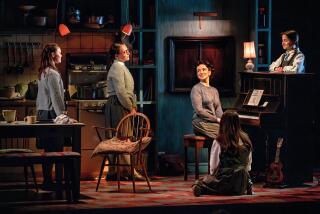STAGE REVIEW : Superb Cast Plays Storey’s ‘Home’ Like a String Quartet
There is no question while watching Michael Peretzian’s production of David Storey’s “Home” at Theatre 40 that the huge painted upstage sky on Nancy Dunn Eisenman’s set is just that--painted. But as the day wanes for Storey’s lonely people and twilight grows (Walter J. Weber’s lights), the sky does change. Or is it that Harry and Jack (Jay Bell and Mitchell Edmonds), forever weather watching, make us believe it?
It’s the mind’s eye at work, of course, coupled with honed language superbly spoken. Peretzian’s staging is also a case of forgetting about the rest of the world; for two hours, there are only these words, these characters. In fact, they are the world.
Or, at least as Storey would have it, England. England after the empire, after the War, after everyone has slowly, quietly lost their minds. This sentiment, running just under the surface for most of the play, only comes to light at the end, and even then, not emphatically. Only a master could finesse such a Grand Concept and not sink the ship, and 19 years since its premiere, “Home” is starting to look like a masterpiece.
There are five characters, but “Home’ is essentially a piece for four, with Harry and Jack predominant. The closest musical equivalent--and anyone paying attention at Theatre 40 is hearing a kind of on-stage music--is one of Beethoven’s last string quartets. Interestingly, the women, Marjorie and Kathleen (Dee Croxton and Aileen Fitzpatrick), are not the violins. The themes and the curious interplay of vitality and surrendering to death all belong to the men.
There they are, staring out at the sky and filling the day with observations not always in complete sentences. Harry’s and Jack’s intelligence and upper class backgrounds are clear, although it’s like imagining the original building from the ruins before our eyes. They’re half-gone, yet not addle-headed:
Harry: “My wife was coming up this morning.”
Jack: “Really?”
Harry: “Slight headache. Thought might be better . . . “
Jack: “Indoors. Well. Best make sure.”
Harry: “When I was in the army . . . “
Jack: “Really? What regiment?”
The whole play reads like this: just like “real” people talk, but with something wrong just the same. And it isn’t a case of old people losing it out at the farm.
A young man is here as well (Michael Barak), and he is the most mentally disturbed of all. Peretzian’s program notes report that Storey, despite the famed Lindsay Anderson production with John Gielgud and Ralph Richardson, was writing for men “in their 40s.” Bell and Edmonds play a bit older than that, but they’re still young for retirement. Croxton and Fitzpatrick are no older, and we sense that if they could, none of them would be here.
It’s strangely wonderful, then, to see how Peretzian and company make a play about stasis, alienation, exile and the island mind into an evolving, moving matrix of situations. The levers of control shift almost invisibly between the men and the women, the search for meaning only possible through words. Once this is established, it truly is a crisis when one of the outdoor patio chairs is missing. It’s a feeling reserved only for the great plays, where the universal is always in the specific.
The cast’s reading of Storey’s poetry retains both cadence and the sense of it being spoken for the first time, which is why we forget about the rest of the world. Bell’s frail-looking Harry bottles in his emotions long past what’s healthy for him. Like Edmonds’ Jack, he keeps a huge tragedy pursed just beneath his lips, while patiently waiting for the weather to change. Croxton and Fitzpatrick never just watch, but have their own hidden horrors going on. You are invited to fill in the blanks for yourself.
At 241 Moreno Drive, Beverly Hills High School, on Thursdays through Saturdays, 8 p.m., Sundays, 2 and 8 p.m., until Dec. 17. Tickets: $12-$15; (213) 466-1767.
More to Read
The biggest entertainment stories
Get our big stories about Hollywood, film, television, music, arts, culture and more right in your inbox as soon as they publish.
You may occasionally receive promotional content from the Los Angeles Times.










